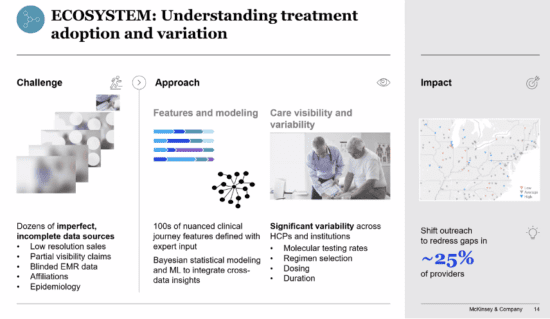AI can have a big impact in oncology through the analysis of genomics and mutations and matching those with the best treatment combinations and the right clinical trials. Tempus taps into clinical and biological data to create a digital twin and uses nearest neighbor analysis to find the best course of management. Another startup developing AI-driven genomic solutions is South Korea-based Syntekabio, which analyzes an individual’s unique genetic map to provide personalized medical treatments.
SOPHiA Genetics’s technology is used by around 1,000 hospitals to detect genomic variants and determine the proper course of treatment for cancer, hereditary disorders and COVID-19.7 Also, using AI algorithms on radiology images can improve radiation treatment in cancer. Varian Medical Systems trains algorithms on diagnostic images to automate radiotherapy treatment planning.
Imagene, an AI startup, directs cancer patients to the proper targeted therapies using only digital images of biopsied tissue, instead of relying on full molecular sequencing and analysis. Imagene says its deep learning algorithms can pick out the biomarkers needed to guide treatments within just two minutes by visualizing the patterns put forward by tumor cells that carry different mutations.
AI is also being applied to other omics data to guide treatment recommendations. For example, Cofactor Genomics uses “Predictive Immune Modeling” based on transcriptomic data to create multi-dimensional biomarkers that can predict a patient’s therapeutic response.






